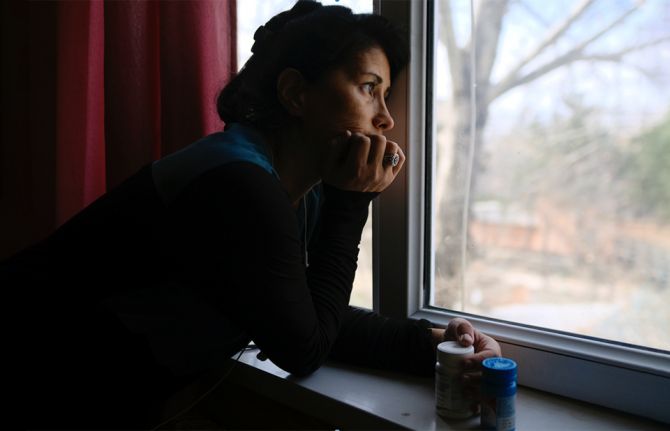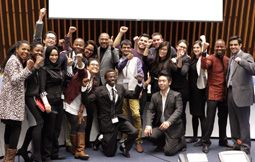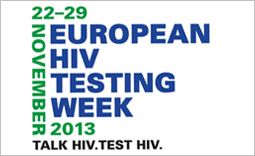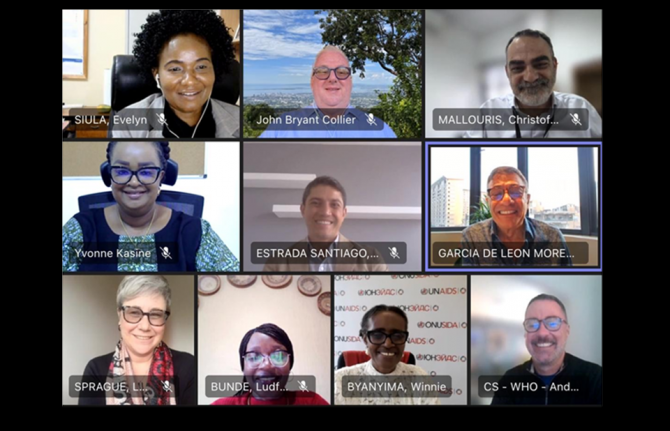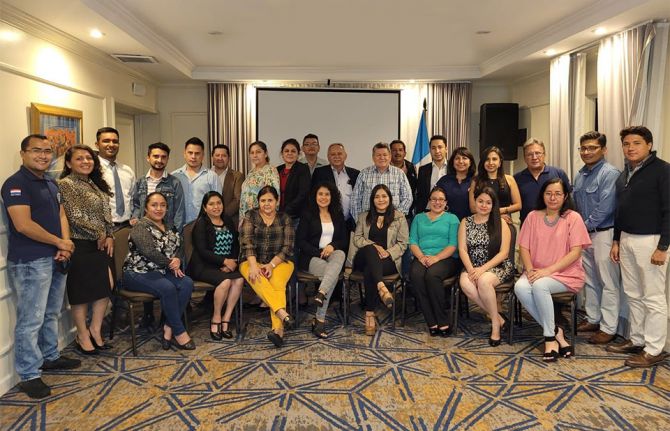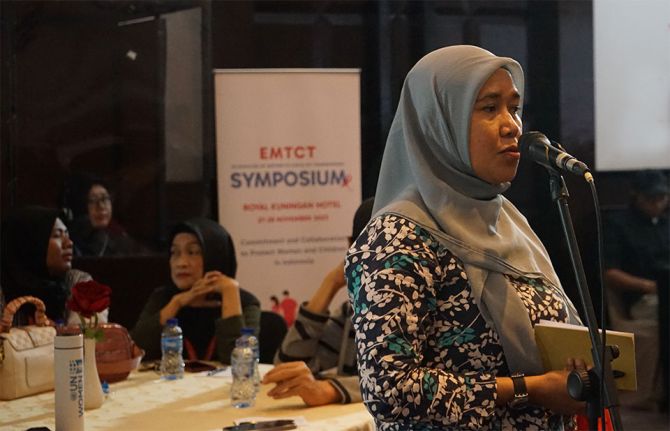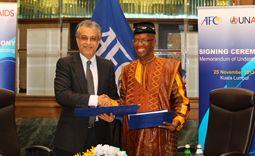
Feature Story
UNAIDS addresses UN Human Rights Council on the impact of punitive laws on HIV
10 June 2010
10 June 2010 10 June 2010
As part of the 14th session of the UN Human Rights Council taking place in Geneva from 31 May-18 June 2010, the Council held on 4 June 2010 an interactive debate with the Special Rapporteur on the right of everyone to the enjoyment of the highest attainable standards of physical and mental health, the Independent Expert on the question of human rights and extreme poverty, and the Special Rapporteur on violence against women, its causes and consequences.
In his report, Anand Grover, the Special Rapporteur on the right of everyone to the enjoyment of the highest attainable standard of physical and mental health, focused on the impact of criminal law on the realization of the right to health and related rights. He specifically reported on the impact of criminalization of same-sex conduct and sexual orientation, sex work, and HIV transmission – three examples of the criminalization of private consensual sexual conduct between adults.
“We hope the report of the Special Rapportueur will help to generate constructive debate, and catalyze change toward a more rights-based and effective AIDS response,” said UNAIDS Human Rights and Law Officer Jason Sigurdson who delivered a joint statement for the UNAIDS Secretariat and UNDP.
The 14th session of the UN Human Rights Council continues in Geneva until 18 June 2010.
Right Hand Content
Press centre:
Joint statement by the UNAIDS Secretariat and UNDP delivered at the 14th session of the UN Human Rights Council. (07 June 2010)
External links:
14th session of the Human Rights Council
Publications:
Related

Feature Story
UNFPA and CARE announce partnership to improve maternal health
09 June 2010
09 June 2010 09 June 2010A version of this story has been published at unfpa.org
 UNFPA Executive Director Thoraya Obaid (centre) with midwives whose key role in maternal health has been highlighted throughout the Women Deliver conference. Credit: Moises Saman
UNFPA Executive Director Thoraya Obaid (centre) with midwives whose key role in maternal health has been highlighted throughout the Women Deliver conference. Credit: Moises SamanUNFPA, the United Nations Population Fund, and CARE International, one of the world’s largest humanitarian aid agencies, have announced an agreement to enhance collaboration on maternal health programmes in more than 25 countries. This move, launched at the Women Deliver conference in Washington DC, will bring together UNFPA’s effective work with national governments and CARE’s expertise in engaging local communities.
"No woman should die giving life. Through collaboration we can make a bigger impact to improve the health of women and girls. UNFPA partners with governments, other UN agencies and civil society to advance the health and rights of women and girls, and we welcome this new partnership with CARE," said Thoraya Ahmed Obaid, Executive Director of UNFPA, when signing the agreement at the conference in Washington, DC.
No woman should die giving life. Through collaboration we can make a bigger impact to improve the health of women and girls. UNFPA partners with governments, other UN agencies and civil society to advance the health and rights of women and girls, and we welcome this new partnership with CARE.
Thoraya Ahmed Obaid, Executive Director of UNFPA
A key element of promoting maternal health is mounting an effective challenge to HIV as, according to a recent World Health Organization report, AIDS-related illness is the leading cause of death and disease among women of reproductive age in low- and middle-income countries.
Through the Mothers Matter Programme, CARE aims to reduce maternal death by improving access to safe pregnancy and delivery services for 30 million women by 2015. Similar to the work of UNFPA, this signature programme will focus on family planning, skilled attendance at birth and emergency obstetric care within the context of a functioning health system. The Mothers Matter strategy aims to empower communities and civil society organizations to advocate for, and participate in, improved maternal health care; to mobilise local governments and civil society to ensure access to responsive health systems; and to promote supportive policy action while advocating internationally for greater global commitment and investment of resources.
Right Hand Content
Cosponsors:
Feature stories:
Women Deliver conference focuses on MDG 5 (08 June 2010)
Linking maternal and child health to AIDS ahead of G8 Summit (01 June 2010)
Publications:
Adding It Up: The Costs and Benefits of Investing in Family Planning and Maternal and Newborn Health (pdf, 2.10 Mb.)
Women and Health: Today’s Evidence, Tomorrow’s Agenda

Feature Story
UN Secretary-General presents progress report on AIDS response
09 June 2010
09 June 2010 09 June 2010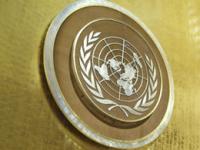
At the 64th session of the General Assembly held on 9 June in New York, Deputy Secretary-General of the United Nations Dr. Asha-Rose Migiro on behalf of United Nations Secretary-General Ban Ki-Moon introduced the 2010 report on the progress made in the implementation of the Declaration of Commitment on HIV.
As part of the 2010 General Assembly AIDS Review, Mr Ban stated that the report puts forward "a set of recommendations that are ambitious, but achievable." He said the report, "presents a strong case for strengthening the links between the AIDS response and the other Millennium Development Goals".
In 2001 the Declaration of Commitment on HIV/AIDS mandated the UN General Assembly to review and debate an annual report by the Secretary-General on progress made in implementing the declaration. Its purpose is to identify problems and constraints, and present recommendations to make further progress in the AIDS response.
Expressing concern over governments cutting back on their response to AIDS to give more to other development efforts, the Secretary-General said, "The cost [of replenishment] may be great. But the cost of inaction will be even greater."
The report noted that the epidemic continues to outpace the HIV response: for every two people starting antiretroviral therapy, five are newly infected.
Recognizing the long-term benefits that will accrue from investing in HIV programmes, national governments and international donors should sustain and increase financial contributions to HIV programmes, it suggested.
The Secretary-General put special emphasis on the fifth MDG which focuses on maternal health, adding, "What is less well-known is that HIV is one of the leading causes of death among women of reproductive age worldwide.”
The report indicated that in 2007, one in five low- and middle-income countries achieved more than 50 per cent coverage of services to prevent mother-to-child HIV transmission, as well as antiretroviral therapy.
"A few years ago, tools to eliminate mother-to-child HIV transmission were just ideas. Now they are being put into practice all over the world," Mr Ban added.
Endorsing the strategic approach taken by UNAIDS to focus on ten priority areas under its Outcome Framework, Mr Ban said, "The Millennium Development Goals are indivisible and should never be pitted against each other."
Millennium Development Goal 6 calls to halt and begin to reverse the HIV epidemic by 2015. But unless the international community dramatically accelerates its efforts, we will not meet that target, the report noted.
It called upon stakeholders in the AIDS response to make a solid commitment towards eliminating mother-to-child transmission and optimizing the health of HIV positive mothers and their families.
It also advised national partners to begin planning now for long-term sustainability of antiretroviral therapy, including addressing the inevitable increase in demand for second- and third-line drug regimens.
Right Hand Content
Feature stories:
General Assembly review on HIV/AIDS 2009 (16 June 2009)
External links:
2010 General Assembly AIDS Review
Tools:
Photo Gallery of the General Assembly review on HIV/AIDS 2009
Publications:
Implementation of the Declaration of Commitment on HIV/AIDS and the Political Declaration on HIV/AIDS (pdf, 1.3 Mb.)
60/262. Political Declaration on HIV/AIDS (pdf, 55.8 Kb.)
2010 Report of the Secretary-General: Progress made in the implementation of the Declaration of Commitment on HIV/AIDS and the Political Declaration on HIV/AIDS (pdf, 1.47 Mb.)
Related

Feature Story
Safe sex during the 2010 World Cup
08 June 2010
08 June 2010 08 June 2010
As the 2010 World Cup kicks off this Friday, thousands of football fans will arrive in South Africa to cheer on their favourite teams.
HIV awareness and prevention is also a high priority during this time. HIV can spread particularly among young people, through the dangerous combination of alcohol and unsafe sex.
As HIV can be spread through unprotected sex, condoms are vital to protecting people from HIV infection. Male and female condoms are the most efficient, available technologies to reduce the sexual transmission of HIV and other sexually transmitted infections.
And to reduce the risk of HIV transmission, advocates count on making condoms readily available. Previously successful campaigns have included free condoms in match venues, hotels, stadiums, bars, and clubs. As one fan said, “condoms are more useful with me than in a warehouse.”
Condoms are a key component of the combination prevention package to reduce the sexual transmission of HIV. Other components include delay of sexual initiation, abstinence, being mutually faithful to each other when both partners are uninfected, and reducing the number of sexual partners.
UNAIDS commends the South African government’s commitment to distribute condoms during the World Cup. We support the efforts carried out by the South African National AIDS Council (SANAC) and civil society groups, including the Treatment Action Campaign and AIDS Consortium, to ensure that condoms and HIV information are made widely available during the tournament.
Each day, 7 400 people are infected with HIV worldwide. In South Africa, the host of this year’s World Cup, 5.7 million people are living with HIV ─ the largest number worldwide.
|
Quick facts about youth and HIV:
|
Right Hand Content
Feature stories:
Ahead of World Cup, national team captains appeal: “Give AIDS the red card” (07 June 2010)
Danny Jordaan and UNAIDS Executive Director discuss global AIDS outreach around FIFA 2010 World Cup in South Africa (04 December 2009)
Publications:
World Cup Appeal to prevent mothers from dying and babies from becoming infected with HIV (pdf, 357 Kb.)
Related

Feature Story
Women Deliver conference focuses on MDG 5
08 June 2010
08 June 2010 08 June 2010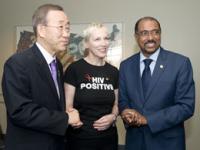 L to R: United Nations Secretary-General Ban Ki-moon, UNAIDS Goodwill Ambassador, Annie Lennox and UNAIDS Executive Director, Michel Sidibé. 07 June 2010. Credit: UNAIDS/S.Johnson
L to R: United Nations Secretary-General Ban Ki-moon, UNAIDS Goodwill Ambassador, Annie Lennox and UNAIDS Executive Director, Michel Sidibé. 07 June 2010. Credit: UNAIDS/S.JohnsonWith maternal and reproductive health as a global priority, a three-day conference, Women Deliver 2010, has kicked off in Washington DC under the theme "Invest in women. It pays." The event’s main focus is to highlight that the Millennium Development Goals (MDG) will not be achieved without investing in women and that there is just enough time, if the world commits funding now, to achieve the MDG’s fifth goal of improving maternal health.
UNAIDS Executive Director Michel Sidibé and newly appointed UNAIDS Goodwill Ambassador Annie Lennox gave the welcome address and opening plenary on the first day of the conference.
“If we integrate HIV into maternal health programmes, we can make huge progress on almost every global development goal. We can stop mothers from dying of HIV and dramatically reduce maternal mortality. Let’s join together,” said Mr Sidibé.
Ms Lennox, who spoke on the topic Women Need a World that Delivers added, "I believe that the AIDS response is an excellent entry-point to better invest in women and girls at all levels, and to advance women's sexual and reproductive rights. We need to empower women and girls so that they can better protect themselves and take control of their own sexual and reproductive health."
I believe that the AIDS response is an excellent entry-point to better invest in women and girls at all levels, and to advance women's sexual and reproductive rights
Annie Lennox, UNAIDS Goodwill Ambassador
About 16 million women over the age of 15 are living with HIV worldwide and in sub-Saharan Africa, women make up almost two-thirds of people living with HIV. In many parts of the world, women have a higher risk of HIV than men.
In cultures where gender inequality persists, women are likely to face barriers in accessing HIV, maternal and reproductive health services due to limited decision-making power, lack of control over financial resources, restricted mobility and child-care responsibilities.
A recent study published in the medical journal The Lancet projects that globally HIV has increased maternal mortality by 20%. While maternal mortality has been on the decline globally, it has been on the rise in many sub-Saharan Africa countries, because of HIV. In South Africa, it is estimated that more than 50% of all maternal deaths can be attributed to HIV.
Considerable progress, however, has been made on the treatment front. Over the years, more women have been able to access HIV treatment services. This is primarily due to the fact that more women are accessing antenatal services to prevent HIV transmission to their infants, and more women are coming forward for HIV counselling and testing.
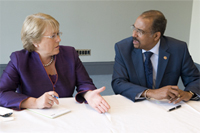 Former President of Chile Michelle Bachelet (left) meets with UNAIDS Executive Director Michel Sidibé during Women Deliver 2010 conference in Washington D.C. Credit: Sylvia Johnson
Former President of Chile Michelle Bachelet (left) meets with UNAIDS Executive Director Michel Sidibé during Women Deliver 2010 conference in Washington D.C. Credit: Sylvia JohnsonWith over 2,000 participants from 115 countries, including 100 government officials from more than 30 countries, the conference was also the platform to announce the initiation of the first trial among women in Africa testing a vaginal ring containing an antiretroviral drug that could one day be used to prevent HIV transmission during sex.
The technology, if successfully tested, would give women around the world a tool to protect themselves from HIV infection. The trial has been initiated by non-profit International Partnership for Microbicides (IPM).
Speaking on the trial, Mr Sidibe said, "Preventing HIV transmission is essential if we are to win the battle in the long-term and protect the health and safety of future generations. If successful, innovations, like microbicides, could have an extraordinary impact.”
The conference, which ends on 9 June 2010, includes over 300 speakers in 118 separate sessions over three days. Topics included “Modern Contraception Comes of Age”, “Strategies to Address Sexually Transmitted Infections” and “Girls Speak: Exploring the Girl Effect”.
Right Hand Content
Key populations:
Feature stories:
Celebrated artist and activist Annie Lennox appointed as International UNAIDS Goodwill Ambassador (02 June 2010)
Linking maternal and child health to AIDS ahead of G8 Summit (01 June 2010)
New study shows significant drop in maternal deaths (14 April 2010)
WHO report on the health of women: AIDS leading cause of death globally in women of reproductive age (09 November 2009)
External links:
Publications:
Joint Action for Results: UNAIDS Outcome Framework (2009–2011) (pdf, 930 Kb.)
Making HIV trials work for women and adolescent girls (pdf, 143 Kb.)

Feature Story
Ground-breaking labour instrument to address HIV in the world of work
08 June 2010
08 June 2010 08 June 2010
A ground-breaking new labour instrument to address HIV in the world of work is one of the issues considered at the annual International Labour Conference (ILC- 99th Session) in Geneva from 2-18 June 2010.
Following ILO’s formal standard setting process, an HIV/AIDS Committee, comprised of 120-150 tripartite representatives, is reviewing ILO’s draft recommendation before its final presentation to the Conference plenary for adoption on 17 June 2010. On 3 June, UNAIDS Deputy Executive Director, Ms Jan Beagle, addressed the HIV/ADS Committee to support the draft formulation of an international labour standard which will be “the first global human rights instrument to focus specifically on HIV and the world of work.”
In 2001, the ILO developed the Code of Practice on HIV/AIDS in the world of work as a framework for workplace action. Since its adoption, it has contributed to fight stigma and discrimination and to break down barriers to testing and treatment in the world of work. Although some progress has been made, prevention and care strategies need bolstering.
Many workers are still subject to stigma and discrimination and the threat, or reality, of losing their jobs due to their HIV status. The international labour standard before this Committee would help change this situation.
UNAIDS Deputy Executive Director, Ms Jan Beagle
If adopted by the ILC, the proposed recommendation on HIV - which builds on and extends the 10 key principles contained in the ILO Code of Practice - would upscale significantly the impact of prevention programmes undertaken by the ILO and UNAIDS. Protecting human rights such as freedom from discrimination play a tremendous but often overlooked role in facilitating the implementation of prevention programmes. Individuals may find in the workplace a confidential and supportive environment to access prevention, treatment, care and support when needed.
As Ms Jan Beagle expressed, “Many workers are still subject to stigma and discrimination and the threat, or reality, of losing their jobs due to their HIV status. The international labour standard before this Committee would help change this situation.”
UNAIDS welcomes in the draft recommendation the promotion of a coordinated action among governments, employers and workers alike, including networks of people living with HIV. As stated by Ms Beagle, ”one of the key strengths that the AIDS response has brought to the development table, is its capacity to connect and mobilize a wide array of constituencies.”
Ms Beagle paid tribute to the ILO Programme on HIV/AIDS and the World of Work, for having raised awareness of the social, economic and development impact of the HIV epidemic and its effects on labour and employment.
The review of the Draft Recommendation by the HIV/AIDS Committee is the last phase of a four year cycle which began in 2007 when the ILO Governing Body requested ILO to place an item on HIV/AIDS and the world of work on the agenda of the 2009 and 2010 Conferences for a double discussion leading to the adoption of an autonomous Recommendation.
Right Hand Content
Cosponsors:
Multimedia:
YouTube video: Speech by UNAIDS Deputy Executive Director Ms Jan Beagle
Speeches:
Speech by UNAIDS Deputy Executive Director Ms Jan Beagle
Feature stories:
International Labour Conference tackles HIV in the world of work (03 June 2009)
International labour standard would strengthen the HIV response in the workplace (21 July 2008)

Feature Story
Ahead of World Cup, national team captains appeal: “Give AIDS the red card”
07 June 2010
07 June 2010 07 June 2010Captains of South Africa, Nigeria, France, Paraguay, Uruguay, Australia, Cote D'Ivoire, Uruguay, Greece, and Serbia national teams join appeal to prevent mothers from dying and babies from becoming infected with HIV.
 Captain of the South Africa Football Team Mr Aaron Mokoena signing the UNAIDS World Cup Appeal at the Team’s Gala Dinner attended by FIFA President Sepp Blatter, 2 June 2010. Credit: George Philipas
Captain of the South Africa Football Team Mr Aaron Mokoena signing the UNAIDS World Cup Appeal at the Team’s Gala Dinner attended by FIFA President Sepp Blatter, 2 June 2010. Credit: George PhilipasEach day nearly 1200 babies are born with HIV worldwide—during the course of a 90-minute football match almost 80 babies will become newly infected.
Captains of the teams competing in the 2010 FIFA World Cup South Africa may be rivals on the pitch in the coming weeks, but off the pitch they are joining forces to support a global campaign to prevent mothers from dying and babies from becoming infected with HIV.
The initiative is backed by UNAIDS Goodwill Ambassadors and international football stars Mr Michael Ballack, former captain of the German World Cup team, and Mr Emmanuel Adebayor of Togo who have personally asked World Cup football team captains to sign this Appeal:
“Between now and 2014, when the next World Cup is played in Brazil, together we can stop babies from becoming infected with HIV and keep their mothers alive and thriving. Hence we appeal: From Soweto to Rio de Janeiro, give AIDS the red card and prevent babies from becoming infected with HIV.” —World Cup Appeal to prevent mothers from dying and babies from becoming infected with HIV
UNAIDS Executive Director Mr Michel Sidibé, who will attend the World Cup opening ceremonies later this week in South Africa said, “I thank Goodwill Ambassadors Adebayor and Ballack for their leadership. Through the Appeal, the global popularity of football and the prestige of team captains will help us raise awareness about the toll of HIV on mothers and babies and promote action to ensure that HIV testing and treatment services reach all who need it.”
Nigerian team captain Mr Kanu Nwankwo was the first to join up, signing the Appeal in the presence of Nigeria’s President, Dr Goodluck Ebele Jonathan who was guest of honour at the gala send-off dinner for the national team.
Mr Aaron Mokoena, captain of Bafana Bafana, nickname of the host team South Africa, signed the Appeal at a good luck dinner for the team hosted by Kirsten Nematandani, President of the South African Football Association. Mr Joseph F. Blatter, President of FIFA; Mr Issa Hayatou, President of the Confederation of African Football; and Mr Danny Jordaan, CEO of the 2010 World Cup Local Organizing Committee were also in attendance. Cote d’Ivoire team captain and UNDP Goodwill Ambassador Didier Drogba, dynamic striker with Chelsea and top scorer this year in the English Premier League, has also signed.

Nigerian team captain Mr Kanu Nwankwo was the first to join the World Cup appeal, signing in the presence of Nigeria’s President, Dr Goodluck Ebele Jonathan who was guest of honour at the gala send-off dinner for the national team. Credit: UNAIDS
Across the Atlantic Ocean in Latin America, Paraguay’s captain Mr Denis Caniza, and Mr Diego Lugano, the captain of Uruguay are signatories to the appeal. European captains have also signed up, including the team captain of France, Mr Patrice Evra, Mr Giorgos Karagounis, captain of the Greek team, and Serbia’s captain Mr Dejan Stankovic, who discussed the initiative at a press conference last week. Also signed on is Mr Lucas Neill, captain of Australia’s team.
The star players are taking action because in 2008 alone, 430,000 babies were infected with HIV, 90% in sub-Saharan Africa. AIDS-related illness is the single largest cause of death of infants and young children in much on Africa, and the leading cause of death of women of reproductive age across the world.
Countries are however making progress in stemming mother-to-child transmission of HIV. Nearly half of all HIV-positive pregnant women in low- and middle-income countries receive HIV treatment to prevent the transmission of the virus to their babies. These efforts are helping to improve maternal and child health and bring us closer to achieving all the Millennium Development Goals by 2015.
FIFA (International Federation of Association Football) is playing its part in tackling HIV. The Football for Hope Centre in Khayelitsha in the outskirts of Cape Town opened its doors in December, the first of 20 such community centres that will address HIV and other key issues affecting young people across the continent. FIFA will also screen advertisements for condoms and HIV prevention messages at fan parks during the World Cup where fans can view the matches.
“HIV infections in infants have been virtually eliminated in many high-income countries,” said Mr Sidibé. “Now we must apply the tools at our disposal to create an HIV-free generation in Africa and worldwide.”
“We can make change happen in the four years to come—using the power and outreach of the game of football,” states the Appeal. “We can reach out to men and women, families and football fans worldwide to ensure that children do not become infected.”
Right Hand Content
Feature stories:
Danny Jordaan and UNAIDS Executive Director discuss global AIDS outreach around FIFA 2010 World Cup in South Africa (4 December 2009)
External links:
2010 FIFA World Cup South Africa
Publications:
World Cup Appeal to prevent mothers from dying and babies from becoming infected with HIV (pdf, 357 Kb.)
Related

Feature Story
African Ambassadors and UNAIDS join hands to eliminate mother-to-child transmission of HIV
03 June 2010
03 June 2010 03 June 2010
UNAIDS Executive Director Michel Sidibé addressing the Ambassadors to the African Union. 31 May 2010
Preventing the transmission of HIV from mother to child was high on the agenda at a meeting in Geneva of 50 Ambassadors to the African Union and UNAIDS Executive Director Michel Sidibé.
Each year, nearly 400 000 children in Africa are born with HIV. An estimated 45% of HIV-positive pregnant women in the region receive antiretroviral drugs to prevent HIV transmission to their children, and just 28% of pregnant women are tested for HIV. In many countries on the African continent, AIDS has become the leading cause of death among infants and young children.
Strong leadership and political will are vital to achieve universal access and the Millennium Development Goals.
UNAIDS Executive Director Michel Sidibé
“HIV infections in infants have been virtually eliminated in many high-income countries,” said Mr Sidibé. “Now we must apply the tools at our disposal to create an HIV-free generation in Africa.” The lives of mothers and their babies can be saved through a combination of HIV testing and counselling, access to effective antiretroviral prophylaxis and treatment, safer delivery practices, family planning, and counselling and support for optimal infant feeding practices.
During the meeting, Mr Sidibé recognized the substantial achievements of African countries in the AIDS response. More than 4 million people in Africa are now accessing antiretroviral treatment, up from about 2.1 million in 2007. In the last six years, approximately 400 000 new infections have been averted on the African continent.
Despite progress, the continent faces major challenges. “The financial crisis poses a serious threat to sustaining the gains that have been made,” said Mr Sidibé. “Strong leadership and political will are vital to achieve universal access and the Millennium Development Goals.” Mr Sidibé urged African Union Member States to boost their investments in health and to advocate for a fully financed Global Fund in order to sustain and expand the number of people on antiretroviral treatment.
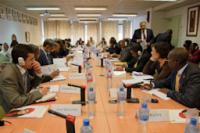
Preventing the transmission of HIV from mother to child was high on the agenda at a meeting in Geneva of 50 Ambassadors to the African Union and UNAIDS Executive Director. 31 May 2010
There was consensus among Ambassadors that—in a time of scarce resources— expanding knowledge and information on HIV was especially important. “With 1.4 million people dying each year in Africa from HIV-related causes, there is an urgent need to increase awareness of this disease,” said H.E. Mr Arcanjo Do Nascimento, Chair of the Group of Ambassadors of the African Union.
The Ambassadors appealed to UNAIDS to support African countries in finding innovative financing mechanisms that complement the resources provided by external donors. They also called on UNAIDS to support the advocacy efforts of African leaders for access to affordable, high-quality, essential drugs for acute and chronic diseases, including antiretroviral drugs.
The meeting was held in the lead-up to the July 2010 Summit of the African Union which will focus on maternal, infant and child health. The Summit will offer an opportunity to highlight progress and challenges in advancing Millennium Development Goals 4 and 5, which call for reducing child mortality and improving maternal health.
African Ambassadors and UNAIDS join hands to elim
Feature stories:
Africa prepares to eliminate mother-to-child transmission of HIV by 2015 (26 May 2010)
African Union summit focuses on economic growth and food security (02 July 2009)
The challenges of pandemics for Africa’s development (27 May 2009)
African Ministers reaffirm commitment to Millennium Development Goals (04 April 2008)
African Ministers meet to discuss 21st century challenges (01 April 2008)
External links:
Related

Feature Story
WHO: HIV Programme highlights significant achievements towards universal access
02 June 2010
02 June 2010 02 June 2010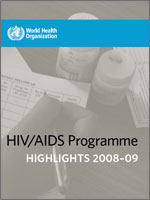
A recent report by the World Health Organization (WHO), HIV/AIDS Programme Highlights 2008-09, outlines major accomplishments of the agency in collaboration with countries and partners in promoting interventions to accelerate the progress towards universal access to HIV prevention, treatment, care and support services.
The report highlights, for example, that there has been a sharp increase in HIV testing in recent years thanks to WHO and UNAIDS’ approach, called the provider initiated testing and counseling (PITC), where healthcare providers specifically recommend an HIV test to patients attending health facilities in certain settings.
WHO now recommends earlier initiation of antiretroviral therapy (ART); delivery of safer, more effective antiretroviral drugs (ARVs); and their prolonged use for the prevention of mother-to-child HIV transmission.
More than half of the 93 reporting countries developing programmes have addressed their human resource shortages in AIDS care through WHO’s strategy of “task shifting”.
Due in part to WHO's efforts, the volume and scope of data to measure progress in scaling-up priority HIV interventions has also improved substantially since 2008. For the first time, WHO, UNICEF and UNAIDS jointly collected data from national programmes worldwide.
Despite funding gaps and implementation challenges, measurable progress was seen in the 2008-2009 biennium. While much work remains, the HIV/AIDS Programme Highlights shows that progress can be achieved, even in the most difficult environments.
WHO: HIV Programme highlights significant achieve
Related

Feature Story
Celebrated artist and activist Annie Lennox appointed as International UNAIDS Goodwill Ambassador
02 June 2010
02 June 2010 02 June 2010 (from right) Annie Lennox, new UNAIDS Goodwill Ambassador, and Michel Sidibé, UNAIDS Executive Director Credit: UNAIDS/B. Hamilton
(from right) Annie Lennox, new UNAIDS Goodwill Ambassador, and Michel Sidibé, UNAIDS Executive Director Credit: UNAIDS/B. HamiltonGeneva, 2 June 2010 – The world renowned Scottish singer songwriter and women’s activist Annie Lennox has been named as International Goodwill Ambassador for the Joint United Nations Programme on HIV/AIDS (UNAIDS). With an award winning career spanning several decades, Ms. Lennox is one of the world’s most outstanding musical voices. Now, she renews her commitment to speak out for women and girls affected by the HIV epidemic.
We must address the rights of women and girls and challenge their second class citizen status, which puts them at greater risk of HIV.
Ms Annie Lennox, UNAIDS Goodwill Ambassador
“The daily brutality faced by millions of women and girls is unacceptable,” said Ms Lennox. “If we are to end the cycle of human devastation triggered by the AIDS epidemic, we must address the rights of women and girls and challenge their second class citizen status, which puts them at greater risk of HIV.” Ms Lennox is a dedicated activist and campaigner working for social justice with numerous organisations. In October 2007, she launched her own “SING” campaign, working to raise awareness and support for women and children affected by the AIDS pandemic in Southern Africa.
She has previously supported UNAIDS, participating in the launch of a five-year action plan aimed at ending gender inequalities and human rights violations.
“How can anyone not be moved by Annie Lennox and her voice? I am sure with her incredible passion and presence, she will raise awareness of the terrible toll HIV has taken on women and girls,” said UNAIDS Executive Director Michel Sidibé, “With her amazing energy, she will make sure international, national and community leaders challenge the injustice of gender inequality.”
I am sure with her incredible passion and presence, she will raise awareness of the terrible toll HIV has taken on women and girls.
Mr Michel Sidibé, UNAIDS Executive Director
The lack of access to quality sexual and reproductive health services contributes to the high number of deaths among women of the reproductive age.
In her new role as International UNAIDS Goodwill Ambassador, Ms Lennox will be in Washington D.C. with Mr Sidibé, from the 7-9 of June to participate in the Women Deliver 2010 conference and 2010 Global Business Coalition conference. She will use these events to advocate for a global movement to focus on the HIV-specific needs of women and girls as well as to empower women and girls so that they can better protect themselves from HIV.
Celebrated artist and activist Annie Lennox appoi
Press centre:
Download printable version (pdf, 20 Kb.)
Contact:
UNAIDS: Saya Oka
Tel. +41 22 791 1697
E-mail: okas@unaids.org
UNAIDS: Tina Bille
Tel. +41 22 791 4928
E-mail: billet@unaids.org



